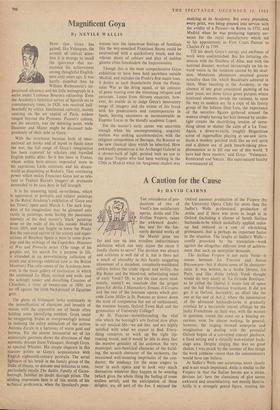A Caution for the Cause
By DAVID CAIRNS
THE coincidence of pro- ductions of two of
Verdi's less satisfactory operas, Attila and The Sicilian Vespers, raises the awkward doubt: has zeal for the for- merly derided works of the Master gone too far and run on into mindless indiscriminate adulation which can only injure the cause it loudly claims to serve? The derision was absurd and criticism is well rid of it; but is there not a touch of absurdity in this faintly sniggering abasement of a decadent, complexity-maddened culture before the crude vigour and virility, the Big Banjo and the blood-red, unhesitating tunes of early Verdi? Or, to put the case more mod- erately, mustn't we conclude that the proper place for Attila, I Masnadieri, Ernani, II Corsaro and the rest of the fourteen operas which pre- cede Luisa Miller is St. Pancras or (lower down the scale of competence but not of enthusiasm), the amateur haunts, Oxford Town Hall and the gymnasium of University College?
At St. Pancras—notwithstanding the vital role which the borough's arts festival now plays in our musical life—we ask less, and are highly satisfied with what we expect to find. Every- thing conspires to work up the right rip- roaring mood; and it would be idle to deny that the massive geniality of the audience, the very municipal, anti-theatrical character of the build- ing, the scratch character of the orchestra, the occasional well-meaning ineptitudes of the con- ductor, the tendency for the same singers to recur in each, opera and to look very much themselves whatever they happen to be wearing (which gives the whole thing the feeling of some endless serial), and the anticipation of these delights, are all part of the fun. I enjoyed the
Oxford amateur production of the Vespers (by the University Opera Club) far more than the Sadler's Wells professional production of Attila; and if there was more to laugh at in Oxford (including a chorus of bereft Sicilian husbands-to-be which unskilfully applied make- up had reduced to a row of rib-tickling grotesques), that is perhaps an important factor in the situation. The laughs at Sadler's Wells— mostly provoked by the translation—work against the altogether different level of achieve- ment that such an enterprise. demands.
The Sicilian Vespers is not early Verdi—it comes between La Traviata an,d Simon Boccanegra—but it shares some of its character- istics. It was written, to a Scribe libretto, for Paris, and like Attila (which Verdi thought would do very nicely at 'La Grande Boutique,' as he called the Opera) it wants lots of space and the full Meyerbeerian treatment. It did not get it at Oxford, inevitably; an effort like the one at the end of Act 2, where the lamentation of the aforesaid husbands-to-be is gradually overlaid by a barcarolle roared offstage by the lucky Frenchmen on their way, with the women in question, round the coast on a boating ex- cursion, went for almost nothing. In general, however, the staging showed enterprise and imagination in dealing with the perennial Oxford bogies of a converted concert platform, a fixed setting and a virtually non-existent back- stage area. Despite singing that was no great shakes, I was struck by the number of fine things the work contains—more than the commentators would have one believe.
At Sadler's Wells one scrutinises more closely and is not much impressed. Attila is similar to the Vespers in that the Italian heroes are a mean, devious lot; here the clumsiness of plot seems awkward and unsatisfactory, not merely bizarre. Attila is a strangely genial figure, treating his enemies with a grand and careless magnificence; his Holofernes-like end excites no admiration or sense of justice. Of course the score is frequently vital and inventive: the solemn pro- gressions associated with Attila's vision of Christian Rome, sunrise over what is to be the site of Venice, Odabella's expressive aria in Act I, the panache and power of the whole banquet scene. But it is not good enough to overcome the libretto's false emphasis or to avoid an uncomfortable discrepancy between the grandeur of the subject-matter and the coarse 'Italian opera' treatment of it.
A large stage and lavish effects are what Attila wants; and one can understand why Giulini wanted Covent Garden to produce it (though one can also understand why Covent Garden refused). Perhaps the conclusion must be that it is a St. Pancras piece. -It is certainly not a work for Sadler's Wells. Alas, Sadler's Wells seem to go out of their way to emphasise the fact—so far, indeed, that I hope it may be recognised that the failure of this production proves nothing definite against early Verdi in the professional metropolitan opera house. This Attila is a case on its own. Almost every- thing works to its ruin: the translation, which is a sad betrayal of the usual Sadler's Wells standards of clarity and good sense ('Reigns in the East a dotard,' 'But the brackish lagoons which surround us shall engender a phoenix of glory,' the cadence of a poignant recitative phrase sung to the word 'interruption,' and so on); the lugubrious lighting which, incredibly, remains dark even for the blazing vision scene; Ralph Koltai's unsatisfactory arrangement of ramps and poles and shaggy costumes, which is both undistinguished in itself and wrong, too 'serious,' for the opera; John Blatehley's fumb- ling and wearily conventional production, which does far too little to make something dramatic of the performances of Donald McIntyre, Rae Woodland, Donald Smith and Harry Mossfield (which all, in different ways, have admirable vocal qualities).
I do not minimise the difficulty of rhaking Attila work on the Sadler's Wells stage; but this (up to, at least, the final scene, which ■ I missed, only being able to hear it on the broad- cast) was not the way. Everyone now has his own idea of what is the best early Verdi. The claims of Giovanna d'Arco have lately been advanced, and 'I would very much like to see I Due Foscari done professionally in London. 1 doubt if serious damage has yet been done to the cause, but we will have _to be more care- ful what we choose for the big treatment and how we treat it.
'It's for you.'







































 Previous page
Previous page